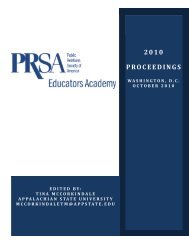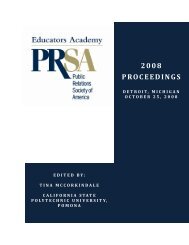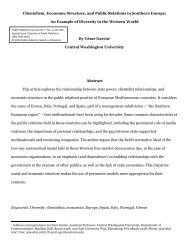2012 PROCEEDINGS - Public Relations Society of America
2012 PROCEEDINGS - Public Relations Society of America
2012 PROCEEDINGS - Public Relations Society of America
Create successful ePaper yourself
Turn your PDF publications into a flip-book with our unique Google optimized e-Paper software.
Organizational factors are important in understanding how practitioners cope with worklife<br />
conflict. The more organizational demands existed for separating life from work, the more<br />
instructions seemed to be necessary for employees to better cope with work-life conflict. Positive<br />
thinking, as a type <strong>of</strong> cognitive coping, tended to increase when there was more immediate<br />
supervisor support and to decrease when an organization‘s work-life culture was skewed toward<br />
promoting work as the sole priority.<br />
Organizational Support is Essential to Proactive Coping<br />
According to the survey results, there are six distinct types <strong>of</strong> coping strategies that are<br />
used by practitioners in work-life conflict situations. These coping strategies are largely<br />
aligned with Duhachek‘s (2005) multidimensional coping model. Noticeably, along with<br />
positive thinking, denial, instrumental support, and avoidance, emotional support and<br />
emotional venting provide better data fit when combined into one factor, emotional coping,<br />
while rational thinking and action explain the results better when grouped under one factor,<br />
rational action. Female practitioners tend to use more, i.e., a greater variety <strong>of</strong>, coping<br />
strategies across the board, compared to male practitioners.<br />
Among all coping strategies, proactive ones such as rational action and positive<br />
thinking are the most used coping strategies among the practitioners surveyed in this study.<br />
Organizational factors, together with conflict stressors, play a core role in facilitating or<br />
preventing practitioners from proactive work-life conflict coping:<br />
Rational action. According to Jin (2010), this type <strong>of</strong> coping is most objective and<br />
proactive, <strong>of</strong>ten evidenced by the following: analyzing what is going on with one‘s work and life;<br />
stepping back from the stressful conflict and being objective; controlling emotions in order to<br />
avoid acting rashly; concentrating on pondering how a given problem can be resolved and<br />
making a plan <strong>of</strong> action, which involves generating and assessing different potential solutions.<br />
According to our findings, practitioners tend to implement rational action coping<br />
strategies when the work-life conflict is predominately caused by work-related pressures and<br />
exhaustion. If the stress is caused by non-work or family pressures, or by the frustration <strong>of</strong> not<br />
being able to apply what works at work to non-work matters, practitioners tend not to use as<br />
much rational thinking or action-taking to handle the situation. In short, practitioners cope with<br />
work stressors more rationally, compared to how they cope with nonwork stressors.<br />
Positive thinking. The primary constraining factor for practitioners to resort to positive<br />
thinking is behavior-driven work-life stressors, meaning practitioners try and yet are <strong>of</strong>ten<br />
frustrated by the fact that problem-solving behaviors at work do not translate well to non-work<br />
problems. When practitioners are stressed by behaviors or problem-solving plans not applying to<br />
both work and life, they tend to stay away from positive thinking. It is important for<br />
practitioners, when feeling behavior-driven stressors, to be more mindful <strong>of</strong> their thought<br />
processes <strong>of</strong> looking at the bright side <strong>of</strong> things or focusing on the positive aspects in both work<br />
and life so as to make the best <strong>of</strong> the situation.<br />
Organizational support is most helpful in facilitating this type <strong>of</strong> proactive coping among<br />
practitioners. As our findings show, when there is more support from a practitioner‘s immediate<br />
supervisor at work, more positive thinking is likely to be used in coping with work-life conflict.<br />
In addition, whether an organization‘s culture is open or closed to work-life balance also<br />
influences how much practitioners use positive thinking under stress: If an organization strongly<br />
believes and acts as if work is the only priority for an employee, then positive thinking route to<br />
coping is likely to be closed. This suggests that if an organization would like to make<br />
practitioners look at the bright side <strong>of</strong> work-life conflicts, institutionally, the organization needs<br />
97
















